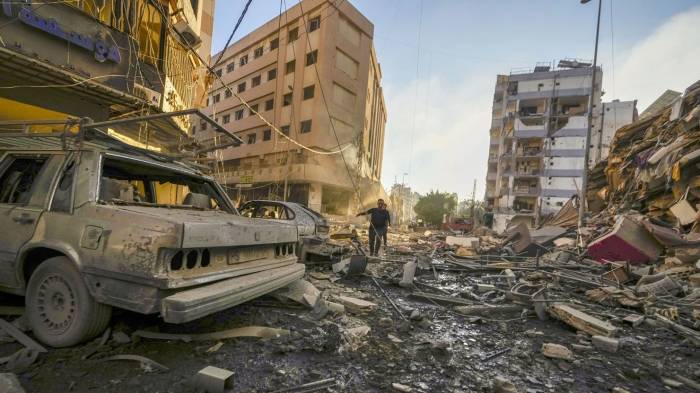Israel has escalated airstrikes on Beirut Tuesday while its security cabinet debates a ceasefire with Hezbollah that is expected to kick in on Wednesday. The agreement is to put an end to the deadly conflict between Israel and Lebanon, which began with last year’s Gaza war that killed thousands of people. Positive remarks by Lebanese Foreign Minister Abdallah Bou Habib and a senior Israeli official, expressing confidence that his country would approve the deal, were seen to boost optimism in the ratification of the ceasefire.
Strikes Continue; Issues Deepen
On the other front, airstrikes by Israel reached a peak as they targeted Hezbollah’s strongholds in the southern suburbs of Beirut. Lebanon’s health ministry reported at least 18 deaths that day, including seven in a concentrated attack hitting 20 targets in two minutes. Strikes extended to Tyre and Baalbek, with panic hitting central Beirut as residents scampered north. Hezbollah fired rockets into Israel, sending in one of its heaviest barrages on Sunday.
Israeli Defence Minister Israel Katz emphasized a “zero tolerance” policy towards any infractions of a cease-fire while calling for effective enforcement at the hands of the U.N. In rebuttal, Lebanese officials said they were prepared to station 5,000 troops in southern Lebanon when Israeli forces started pulling out and indicated U.S. commitment to reconstruction support.
Terms of the Cease Fire and International Intermediaries
The announced ceasefire deal would ask Hezbollah to vacate armed to the south of the Litani River so that Lebanese forces could assume full responsibility there. In a mediated effort by the United States and France, Presidents Joe Biden and Emmanuel Macron are going to announce the deal. Preparatory for an address on Tuesday evening, Israeli Prime Minister Benjamin Netanyahu’s office scheduled the appearance, fueling speculation that such a speech might indeed represent the final formal approval of the deal.
The cease-fire holds the promise of a 60-day truce; yet, Western diplomats clarified it would not spill over into Gaza, which Israeli forces keep on a war footing against Hamas. In recent months, Israel has reportedly killed Hezbollah leader Sayyed Hassan Nasrallah and key commanders as part of its effort to weaken the group’s influence.
Humanitarian Toll and Prospects for Peace
More than a million people in Lebanon are displaced by the conflict, with over 3,750 killed in the last year. A ceasefire would let 60,000 displaced Israelis go home; however, Israel wants to maintain the right to act on “imminent threats” in Lebanon under an ancillary agreement with the United States.
Conjecture aside, while both sides appear exhausted with protracted hostilities, the road to peace appears uncertain. Lebanon has contested provisions authorizing Israeli military action, pointing to the problem of how to achieve a lasting ceasefire. However, mounting diplomatic momentum offers hope for an end to the bloodshed.















